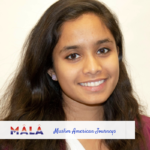Farzana Ahmed: My Path to Representing and Encouraging Diversity in the Legal Field
Farzana is a recipient of the 2019-2020 MALA Scholarship Program, which seeks to assist rising leaders in the pursuit of higher education through the art of storytelling.
Finally on my own. I began my journey of finding myself and understanding who I am in college. At home, I grew up feeling though I had to choose whether I was American or Pakistani. I had it figured out. In school I was the cross-country runner and karate kid and spoke to my close friends who did not make me feel uncomfortable about my identity or about my Pakistani heritage. At the mosque, I was the proper Muslim girl that my Sunday school peers understood. Beginning in college I knew that was not how I wanted to be for the rest of my life. Two individuals in one body.
I arrived at college a few weeks early for cross country season and immediately felt accepted and embraced. My team became my family and gave me the strength to be myself. I wore shorts and did not wear a hijab, but my team understood that all Muslims are not the same. They respected my dietary restrictions and my beliefs. My trainer coordinated on a workout plan and schedule with me for Ramadan. I was comfortable, happy, and one individual.
With my team accepting in whole, I tried joining the Islamic club, but initially found a not as open environment. My first year, the president was very conservative and, perhaps unintentionally, made me feel as though my sports activities and choice not to cover up as taboo. So, I did not attend meetings often, but the vice-president aided in me feeling safe in the Muslim community at my college. He would invite me to their events and supported my individuality. After the president graduated, there was a large influx of South Asian Muslims who took over the club and showed me the diversity of perspectives and acceptance. They showed me being a part of an ummah does mean encouraging people to be themselves, embracing their personal experiences, and being a good community member. At a point where I had decided I might not belong to an ummah because of who I am, they showed me in the U.S., a country with diverse people and different religions, people over emphasize the need to be perfect examples and unintentionally make other Muslims feel like outsiders. Together, we built a stronger community, one that had open events so the college community could experience, learn, and understand. The two sides of me I grew up to accept individually became my college experience comes full circle in shaping my identity and who I am with my study abroad.
As a first-generation Pakistani American woman whose background is not well represented in the legal field, I want to share my unique perspective in the legal field. My South Asian heritage has shown me the importance of diversity in society. In college, I studied abroad in Japan, where I met other Americans and South Asians. Learning about their lives and becoming a part of Japanese communities taught me the difficulties one faces in a society with cultural disparities happens in both diverse countries like the United States or homogeneous country like Japan. Immigrants have strong cultural bonds to their previous communities that influence their decision-making and personal legal goals. First generation cohorts have an additional factor to consider, as they are split between two worlds and must attempt to balance cultural values. I experienced both growing up in the United States and in my study abroad. I understand the importance of cultural values and challenges of living in a society that does not emulate those values. In the legal field, there is a need for more than just empathy, but a need for some personal knowledge of these struggles. This representation is essential to aiding clients because their choices and beliefs can change the way an attorney must tackle a case. I will use my understanding of the importance of cultural and personal values to aid clients.
I am a first-generation Pakistani-American woman who wants to do more than follow her life-long goal of being a lawyer. I want to encourage and demonstrate understanding people’s experiences to create growth in individuals, communities, industries. My college experience showed me the importance of recognizing and accepting differences to build a stronger community. I saw the flaws in being narrow-minded and the celebration and growth that can occur when people fail to see the importance of diversity and the ability to recognize different experiences. My identity is more than just my beliefs, my passions, and activities, it is also the mark I want to leave with society, one where I want to show people they can be accepting of others with differing opinions, beliefs, and experiences.


